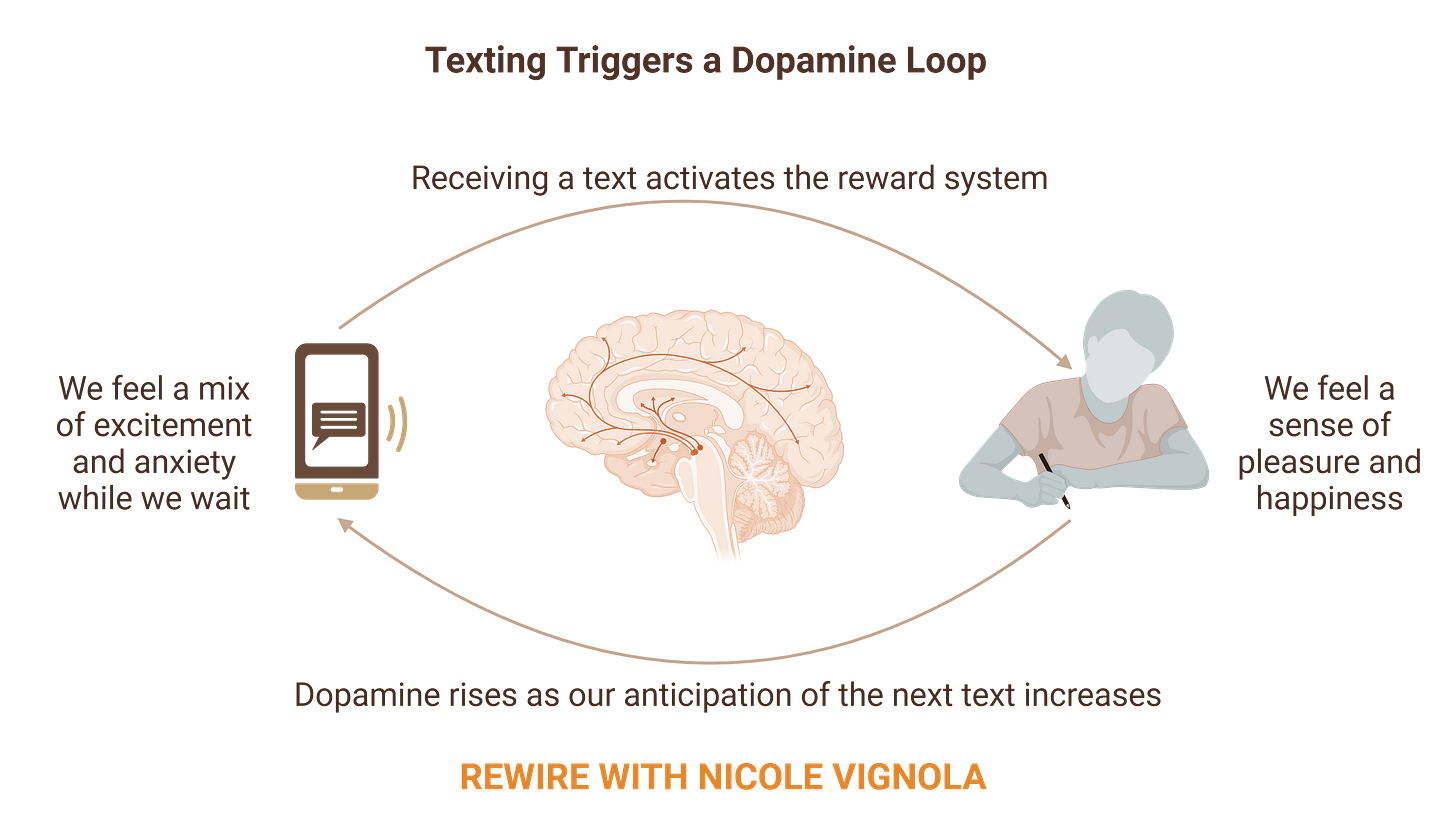Hey Rewire Collective!
Welcome to this week's newsletter. We’re diving into the neuroscience behind your craving for texts back, and your anxiety when that doesn’t happen instantly.
Why does texting cause so much anxiety? Desperation? Anticipation? And then finally a burst of pleasure when you do get that text back?
Side note: I am considering texting to make any kind of social communication via a phone – so a text, snapchat, Instagram DM, whatever your chosen poison.
Well, texting triggers a dopamine loop, causing us to crave the text (1). Remember, dopamine drives the craving and wanting we feel towards a reward, so this dopamine loop keeps us stuck waiting and wanting. When we finally get the text back, BAM! a rush of pleasure.
But it’s quickly replaced by the waiting and wanting all over again until the next text. This is comparable to the high and then craving people feel with drug addictions, hence the term ‘internet addiction’ (2).
Interestingly, we see that our brain waves are altered when we text (3). Studies using EEGs (think a bunch of electrodes stuck to your head to monitor electrical activity) show that our cortical processing is activated when we text (3). It is possible this could underlie our changed ability to focus our attention when using our phones (4).
This is why in Rewire, I recommend always doing a spring clean on your phone! If you want more tips about how to break your phone addiction, feel better when using social media, and prioritise your mental health, check out the book!
Why does texting cause this dopamine loop but a phone call doesn’t?
Unpredictability. This is key to any addiction and it’s what keeps us going back. We might get a text back in 5 minutes. But it might be an hour. Or it could be a whole day. We just don’t know when that dopamine hit is going to come (5, 6)!
P.S. This is why IN MY PREVIOUS NEWSLETTER ON CHANGING HABITS, I recommend rewarding yourself at random intervals to keep the excitement!
The flip side of this massive dopamine rush we get when a text is unpredictable is that we sit in anxiety waiting for the text to come (7, 8). Uncertainty underlies many anxiety disorders, and therefore it isn’t a big surprise that the unpredictability of a text triggers the same anxiety (8). Evolutionarily, it makes sense that our brain would not like uncertainty of future events, as it may risk our survival. So, our brain has developed ways to anticipate future events and then compare, known as prediction error signalling. This signalling occurs in the midbrain (9), and also involves areas of the emotional brain (10, 11), like the striatum, insula, and cingulate cortex.
A combination of dopamine reward and prediction signalling (‘he’ll text me back soon’), plus our emotional beliefs about the situation (‘he must not like me’) can lead to our anxiety about the unknown text back.
Anxious Attachments are seen as:
Constantly seeking reassurance (12).
Neediness (12).
Now this existed before phones, but phones give us an unprecedented amount of access to a person. They could literally text us every minute of the day to tell us how much they love us. And they’re not. So they must hate us, right? Of course there’s more to anxious attachment than that, but texting can really exacerbate this feeling of anxiety about a relationship.
What to do?
Obviously, if you think you have an anxious attachment style, working through that in therapy would be the first step. But some steps you can take while you’re working on it are:
SIGN UP TO MY COURSE: REWIRE YOUR HEART WITH ME 💔
💔 I’ll be working with you to teach you how to let go, stop obsessing, and stop constantly checking your phone! Trust me, I’ve been there.
💔We’ll work to restore your confidence and rebuild your identity.
💔Learn to stop overanalysing and break your cycle of overthinking.
Prioritise phone calls! These don’t promote the same dopamine loop, and they actually bring out our empathetic nature more than texts (13).
Mindfulness and meditation can reduce the activity of our amygdala (think emotions, fear, survival), helping us to control our impulses.
Exercise produces natural dopamine!
Until Next Week,
Nicole x
P.S. Leave a comment below for future newsletter requests!
References
https://www.cell.com/iscience/fulltext/S2589-0042(21)00465-X
https://pmc.ncbi.nlm.nih.gov/articles/PMC4267764/
Irresistible: Why We Can’t Stop Checking, Scrolling, Clicking and Watching By Adam Alter (Book).
https://www.sciencedirect.com/science/article/abs/pii/S0278584619307304
https://onlinelibrary.wiley.com/doi/pdf/10.1155/2020/8866386
https://www.webmd.com/mental-health/what-is-anxious-attachment
https://www.apa.org/pubs/journals/releases/amp-amp0000147.pdf
OVERVIEW - https://pmc.ncbi.nlm.nih.gov/articles/PMC7366948/




Very useful, thank you! 💛